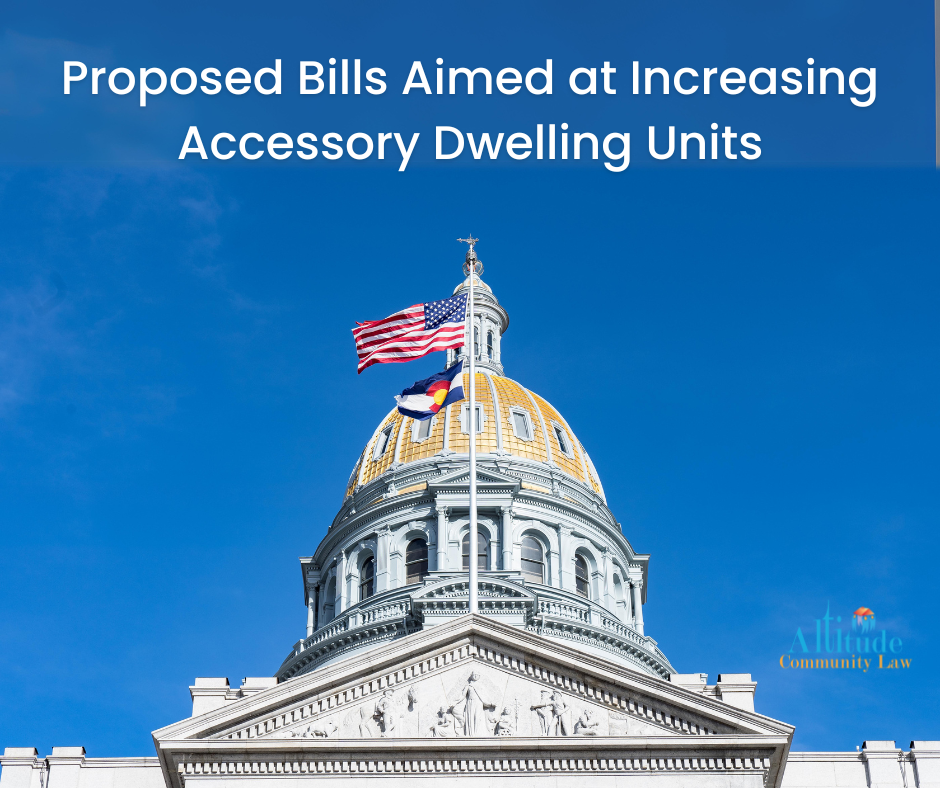
Among the proposed legislation for 2024 includes two dueling bills, HB24-1152 and SB24-154 which focus on Accessory Dwelling Units (ADU). An ADU is a secondary dwelling unit with a complete independent living space for one or more persons. ADUs are limited to two (2) bedrooms, a kitchen, sleeping area, and full bathroom facilities. ADUs may be either detached (standalone or above an accessory building) or attached (in a basement or in an attached addition) to an existing dwelling.
HB24-1152
Designed to address housing shortages in Colorado, HB24-1152 would increase the number of ADUs in certain municipalities, regardless of whether those communities already allow ADUs. This bill would impose residential zoning standards by making ADUs a “use by right” in single-family zones. The impact of this bill is that it would prohibit local governments from maintaining owner-occupancy rules, design or dimension standards, and parking.
This bill would apply to “subject jurisdictions,” which are defined as follows:
- A municipality that has a population of 1,000 or more and that is within the area of a metropolitan planning organization (but is not part of any homeowner’s association); or
- The portion of a county that is both within a census designated place with a population of ten thousand or more, as reported in the most recent decennial census, and within the area of a metropolitan planning organization.
If passed, this bill would require those communities to permit one ADU as an accessory use to a single-unit detached dwelling in. This bill also creates an ADU fee reduction and encourages the use of grant money to offset costs incurred by communities. As written, Colorado has the power to spend $8 million to establish and operate ADUs.
SB24-154
This senate bill creates a series of requirements for ADUs in subject jurisdictions. Interestingly, the definition of subject jurisdiction is different than in HB24-1152. SB24-154 defines a “subject jurisdiction” as unincorporated portion of a county that is not within either (1) a unit owners’ association; or (2) an area identified as having a high fire intensity on the fire intensity scale published as part of the Colorado state forest service wildfire risk viewer.
This bill will require a subject jurisdiction to allow the conversion of an ADU, subject to an administrative approval process. Similar to the house bill, this also would prohibit subject jurisdictions from applying “restrictive” design or dimension standards to an accessory dwelling unit. This bill also includes an economic program to offset the costs.
If passed, either HB24-1152 and SB24-154 will render associations powerless in enforcing restrictive covenants and architectural review guidelines as they pertain to ADUs.
We will keep you up to date on this bill through our 2024 Legislative Tracker.
If you have any questions about the newly proposed foreclosure sale bill, please contact one of our Altitude attorneys at 303-432-9999 or email us at [email protected].
Are there any requirements about what constitutes an ADU in terms of use? Any audit or enforcement provisions?
Is there anything in the bill that prevents the ADUs from merely becoming extension of the main house (i.e. guest rooms, home offices, etc)?
Each city/municipality will have its own requirements and regulations for ADUs. For example, the City of Wheat Ridge allows ADUs to be either attached or detached, but Denver Zoning Codes mandate that ADUs must be detached from the primary residence. Associations should check their local codes and ordinances to see how ADUs are defined. Enforcement falls to the city/municipality’s local laws and zoning codes. By definition, ADUs are secondary, independent living spaces. Thus, a single room cannot be an ADU.
I believe you are saying these bills would not allow HOA’s to prohibit stand alone ADU’s on a homeowners property. Is that correct?
That is correct; these bills, as written, will not only prevent associations from prohibiting ADUs, but will also prevent associations from applying design guidelines to any ADUs.